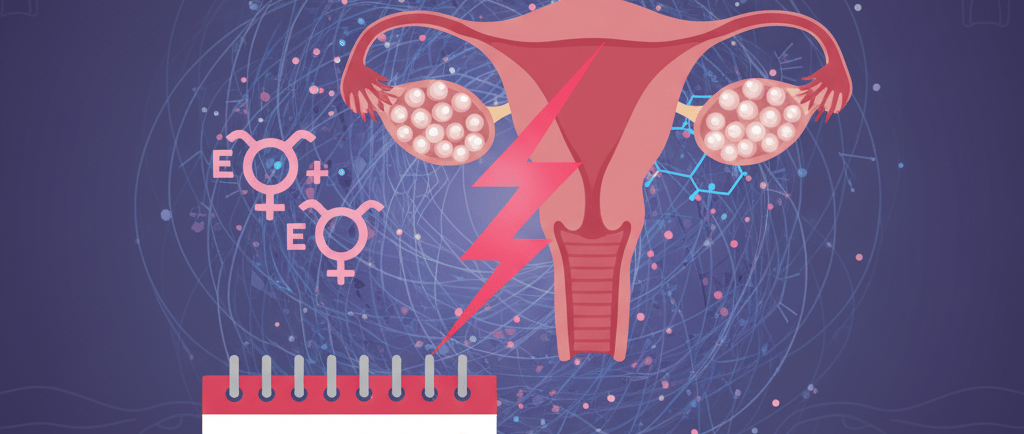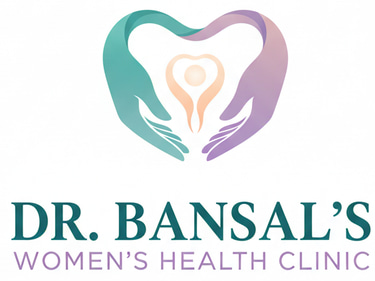Best PCOS Symptoms Treatment in indore
Struggling with PCOS symptoms like irregular periods or weight gain? Discover the best PCOS diet, supplements, and lifestyle changes to take back control of your health.
Dr. Shreyas Bansal
10/14/20253 min read


Polycystic Ovary Syndrome (PCOS / PCOD): A Stepwise Analysis of the Symptoms.
Polycystic Ovary Syndrome (PCOS), also known as Polycystic Ovarian Disease (PCOD), is a frequent and complicated hormonal and metabolic illness in women of reproductive age. It is one of the major causes of anovulatory infertility, and it is a constellation of symptoms that are of a wide range of severity, not only affecting the reproductive system but the entire body as well. The diagnosis of the mixture of irregular periods, evidence of excess androgen (male hormone), and polycystic ovaries on ultrasound are three of the primary characteristics that characterize the condition and lead to a diagnosis.
1. Abnormal Menstrual Cycles and Anovulation.
The most frequent and, in most cases, the initial symptom of PCOS is a disturbance in the normal menstrual cycle. This is because the hormonal imbalance, which is mostly high levels of androgens, disrupts normal maturation and release of an egg (ovulation).
Oligomenorrhea/Amenorrhea: Ovulation cycles can be few (less than nine cycles a year), extremely irregular, or even absent.
Fertility Problems: PCOS is the most widespread cause of infertility in females, as it requires regular ovulation to conceive. It is not until the time they start trying to conceive that many women learn that they have PCOS.
2. Excess Androgen (Hyperandrogenism) Signs and Symptoms
Androgens, in other words, male hormones, are manufactured in minimal quantities in all women. Excessive ovarian production is manifested in PCOS, with some symptoms being highly noticeable and painful:
Hirsutism: This refers to the development of hair of coarse and dark male-pattern hair, most often on the face (chin and upper lip), the chest, abdomen, and back. This influences up to 70 percent of the PCOS women.
Acne and Oily Skin: The overproduction of androgens causes an unremitting flare-up of acne, which is, in most cases, acne on the face, chest, and upper back.
Androgenic Alopecia: This is pattern baldness or loss of hair on the head in males, which is psychologically difficult for the affected individuals.
3. Metabolic and Systemic Symptoms.
PCOS is directly connected with the metabolic malfunction, namely, Insulin Resistance, attributed to the inability of the body to react to the hormone insulin. This is also suspected as one of the major causes of the condition because high levels of insulin are perceived as an indication that the ovaries should secrete even more androgens.
Weight Gain and Difficulty Losing Weight: A number of women with PCOS gain weight, especially around the abdomen. This insulin resistance predisposes it to an extremely difficult time in the effort to maintain a healthy weight.
Acanthosis Nigricans: The skin may have dark, velvety skin in areas of the body that are folded together, e.g., around the neck, armpits, or the groin. This is an indicative marker of elevated insulin.
Fatigue and Mood Disorders: Hormonal disorders and stress of coping with symptoms may result in an increased risk of chronic fatigue, stress, and depression.
4. Long-Term Health Risks
Uncontrolled PCOS is not just a problem in reproductive health, as it exposes one to the danger of severe long-term health problems:
Diabetes Type 2: More than fifty percent of all women with PCOS will have type 2 diabetes or pre-diabetes before the age of forty.
Cardiovascular Disease: The disease exposes the person to high blood pressure, cholesterol, and heart disease.
Endometrial Cancer: Infrequent periods imply that the uterine lining (endometrium) is not discharged on a routine basis. Such a long-term thickening may augment the vulnerability to endometrial hyperplasia and, maybe, cancer.
Sleep Apnea: PCOS may predispose to obstructive sleep apnea, especially in people who are overweight.
Although PCOS has no curative therapy, the symptoms can be treated using both lifestyle (diet and exercise) and medical therapies to treat particular conditions that include insulin resistance, excess androgens, and abnormal cycles. Early detection and regular treatment are very important in the prevention of long-term health problems.
Wellness
Dr. Shreyas Bansal has over 46 years of experience in supporting women’s health and wellness. At Dr. Bansal’s Homeopathy Clinic, located at 2 Manish Bhag, Sapana Sangeeta Road, Indore, we offer personalised and gentle homeopathic care for women of all ages. Our treatments focus on balancing hormones, improving overall well-being, addressing menstrual and menopausal concerns, and promoting long-term health—helping every woman feel confident, healthy, and cared for naturally. Best Gynaecologist in Indore
Contact
Support
(+91) 9111110238
© 2025. All rights reserved.
